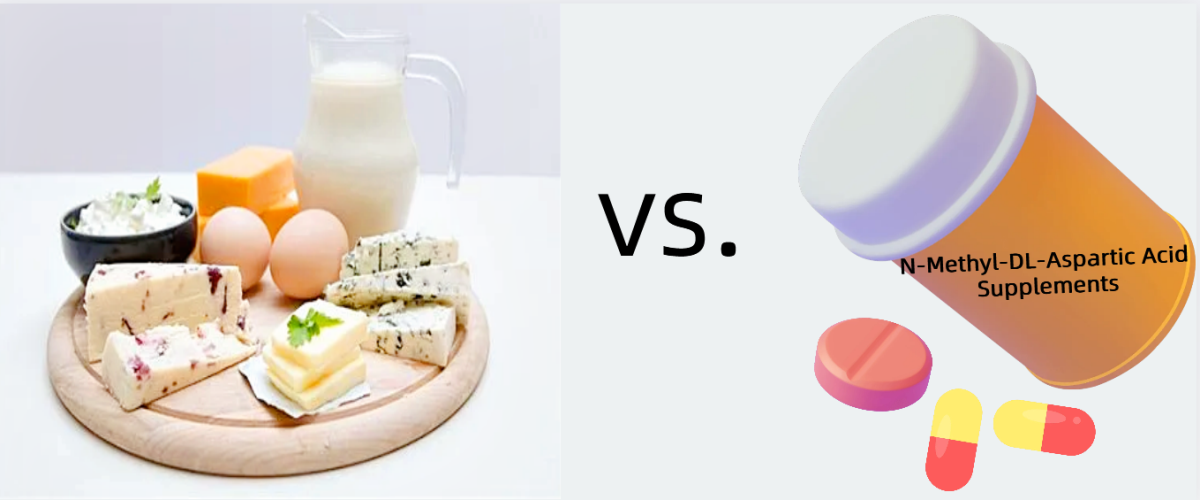N-Methyl-DL-Aspartic Acid is a compound belonging to the class of amino acids. Known primarily for its role in neurobiology, this compound is a synthetic analog of aspartate that activates N-Methyl-DL-Aspartic Acid receptors in the brain. NMDA receptors play a crucial role in a variety of nervous system processes, including learning, memory, and synaptic plasticity.
If you want to know what N-Methyl-DL-Aspartic Acid is, let's first understand what is an amino acid? Amino acid is the basic unit of protein, and protein is the main component of various biologically active substances in human cells, such as enzymes, antibodies, muscles and tissues. Proper intake of sufficient amino acids can maintain healthy protein synthesis and repair, and promote the growth and repair of body tissues.
Amino acids are essential to the proper functioning of many systems and functions in the body. Reasonable and sufficient intake of various amino acids is one of the important factors for maintaining health.
N-Methyl-DL-Aspartic Acid is a methylated derivative of aspartic acid (Astentic Acid) with a methyl group.
It is an isomer of aspartic acid with a methyl group attached to the nitrogen atom. is an amino acid derivative that acts as a specific agonist at NMDA receptors, mimicking the action of glutamate, the neurotransmitter that normally acts at this receptor.
N-Methyl-DL-Aspartic Acid is present in a variety of organisms, including plants and animals.
It has a certain biological activity in the living body and participates in a variety of physiological processes, such as the synthesis and release of neurotransmitters, protein synthesis, etc.
In addition, he is also a neuromodulator, N-Methyl-DL-Aspartic Acid has a regulatory effect in the nervous system, and participates in nerve signal transmission and neuroprotection.
N-Methyl-DL-Aspartic Acid, a compound naturally occurring in the human brain, plays an important role in synaptic plasticity, an important process in learning and memory formation. Synaptic plasticity refers to the ability of the brain's synapses to strengthen or weaken over time, depending on the intensity and frequency of neural activity. NMDAA specifically affectsN-Methyl-DL-Aspartic (NMDA) receptors, which are involved in long-term potentiation (LTP) - the strengthening of synaptic connections.
One of the primary ways in which N-Methyl-DL-Aspartic Acid can improve memory is by facilitating communication between brain cells. NMDA acts as a neurotransmitter that binds to specific receptors in the brain, particularly in the hippocampus, which is responsible for forming new memories. By binding to these receptors, NMDA helps strengthen the connections between neurons, making it easier for information to be processed and stored effectively.
Furthermore, studies have shown that N-Methyl-DL-Aspartic Acid promotes the release of brain-derived neurotrophic factor (BDNF), a protein crucial for the growth and survival of new neurons in the brain. BDNF plays a vital role in neuroplasticity, the brain's ability to reshape and reorganize neural connections in response to learning and experiences. By increasing the availability of BDNF, NMDA supports the creation of new neural pathways, enhancing both memory and learning abilities.
Of course, the benefits of N-Methyl-DL-Aspartic Acid are not limited to memory and learning abilities. Some studies show that it can also improve overall cognitive performance. NMDAAs have been shown to affect other neurotransmitter systems, such as dopaminergic and serotonergic pathways, which are involved in mood regulation, attention, and motivation. By modulating these systems, N-Methyl-DL-Aspartic Acid may help improve focus, alertness, and clarity of thought, further enhancing cognitive performance.
Overall,N-Methyl-DL-Aspartic Acid shows great potential for improving memory and learning. Enhances cognitive functions necessary for academic and professional success by affecting synaptic plasticity and neuroprotective mechanisms. Additionally, its effects on other neurotransmitter systems may help improve overall cognitive performance. While further research is still needed, NMDAA supplementation presents an exciting avenue for those seeking to enhance their cognitive abilities and maintain their mental alertness throughout life.
N-Methyl-DL-Aspartic Acid is a naturally occurring amino acid that plays a vital role in various physiological processes in the body. It is mainly found in protein-rich foods such as meat, fish, eggs, and dairy products. However, it is also available through supplements. Next, let’s explore the similarities and differences between getting N-Methyl-DL-Aspartic Acid from food sources and taking it as a supplement!
First, for obtaining N-Methyl-DL-Aspartic Acid directly from food, protein-rich foods contain varying amounts of this amino acid. Individuals can naturally meet their NMDAA needs by consuming a balanced diet that includes protein sources. Plus, getting N-Methyl-DL-Aspartic Acid from whole foods has the added benefit of containing other essential nutrients you need for overall health.
On the other hand, food alone may not always be sufficient to meet the specific N-Methyl-DL-Aspartic Acid needs of some individuals. Athletes, bodybuilders, or those undergoing intense physical training may require higher doses of NMDAAs to support muscle recovery and growth. In this case, N-Methyl-DL-Aspartic Acid supplementation may be considered.
N-Methyl-DL-Aspartic Acid supplements come in many forms, including powders and capsules, and are readily available. They often contain purified or synthetic NMDAA, making it easier to control and measure intake. Additionally, supplements provide a convenient way to ensure an adequate supply of N-Methyl-DL-Aspartic Acid, especially for those with dietary restrictions, allergies, or difficulty consuming adequate protein-rich foods .
However, it is important to note that N-Methyl-DL-Aspartic Acid supplements should be used with caution. Before incorporating any new supplement into your routine, it is recommended to consult a healthcare professional or registered dietitian. They can evaluate your specific needs and determine the appropriate dose of N-Methyl-DL-Aspartic Acid for your specific situation.
While supplements can provide targeted and convenient additions, they should not replace a well-rounded diet. Whole foods provide not only N-Methyl-DL-Aspartic Acid, but also a variety of additional nutritional and health benefits. Maintaining a balanced and varied diet is essential to ensure optimal health and well-being.
To sum up, we can get N-Methyl-DL-Aspartic Acid from food sources or through supplements. While a balanced diet should be the primary source of NMDAA, supplements can provide a convenient solution for individuals with specific needs or dietary restrictions. However, it is crucial to seek professional advice before incorporating any new supplement into your routine. Ultimately, a combination of healthy eating and targeted supplementation (if necessary) can help ensure optimal levels of N-Methyl-DL-Aspartic Acid for optimal health.
Before using NMA, we must understand the safety and side effects of NMA, so that we can better exert the maximum effect of NMA without harming the body.
In terms of safety first, it's important to note that NMA is generally considered safe when taken in appropriate doses. However, like any other compound, excessive intake of NMDA may cause adverse effects. It is vital to follow recommended guidelines and consult a healthcare professional before starting any supplementation.
One of the potential side effects of NMAs is excitotoxicity. Excitotoxicity occurs when NMA receptors are overactivated, leading to calcium ion overload and subsequent damage to neurons. This condition has been linked to several neurodegenerative diseases, such as Alzheimer's and Parkinson's. However, it is worth noting that excitotoxicity is mainly associated with high doses of NMA, which are not usually found in dietary sources or standard supplements.
Another side effect of NMA is its potential effect on hormonal balance. Some research suggests that excess NMA intake may interfere with the production and regulation of certain hormones, such as testosterone. These hormonal imbalances can have adverse effects on reproductive health and overall well-being. However, more research is needed to understand the precise mechanism and long-term effects of NMA on hormone levels.
Additionally, individuals with pre-exist medical conditions should be cautious when considering NMA supplementation. For example, people with epilepsy or a history of epilepsy should avoid NMA supplementation, as it may trigger seizures due to its effects on NMA receptors.
For Contemplated Use While generally considered safe when consumed in appropriate doses, excessive intake may cause adverse effects such as excitotoxicity and hormonal imbalances. Individuals with pre-exist medical conditions (especially epilepsy and a history of epilepsy) should be cautious when considering NMA supplementation. As with any supplement, it is crucial to consult a healthcare professional before incorporating NMAs into an individual treatment regimen.
Q: How long does it take for N-Methyl-DL-Aspartic to work?
A: The effects of N-Methyl-DL-Aspartic acid can vary depending on the individual, dosage, and method of administration. However, typically, it is believed that N-Methyl-DL-Aspartic acid may take anywhere from a few minutes to a few hours to start working. It is recommended to consult with a healthcare professional or follow the instructions provided by the manufacturer for more specific information on how long it takes for this compound to take effect.
Disclaimer: This article is for informational purposes only and should not be considered medical advice. Always consult a healthcare professional before using any supplements or changing your healthcare regimen.
Post time: Jul-07-2023








